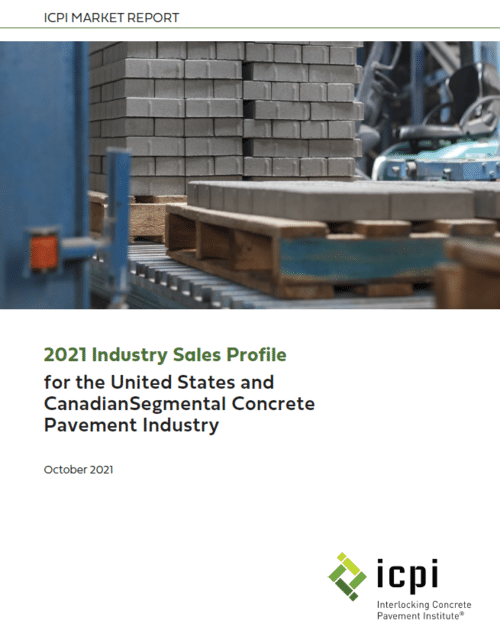For the tenth consecutive year, combined sales of segmental concrete pavement products in the United States and Canada increased according to the 2021 Industry Sales Profile released by the Interlocking Concrete Pavement Institute (ICPI) which reported on 2020 sales.

For the tenth consecutive year, combined sales of segmental concrete pavement products in the United States and Canada increased according to the 2021 Industry Sales Profile released by the Interlocking Concrete Pavement Institute (ICPI) which reported on 2020 sales.
The 2020 projected total of 818.2 million sf is a post-recession high, representing a 9.2% increase from the 742.6 million sf in 2019 and a 71% increase from the low of 478.4 million sf in 2011. The 2020 mark exceeds the all-time high for sales of 800 million sf established in 2006 prior to the recession.
The study surveyed 27 manufacturers representing 30% of all producing companies in the U.S. and Canada. These companies own approximately 58% (145) of the paver producing machines in the two countries. The survey was conducted by Industry Insights, an independent research consulting firm based in Dublin, Ohio.
The estimated combined U.S. and Canadian use of concrete pavers in 2020 equaled 2.21 sf per person compared to 2.05 sf in 2019.
“Covid’s silver lining brought intense demand for traditional and new segmental concrete pavement products,” said Marshall Brown, PhD, ICPI Chair. “Disposable income not spent on vacations went into home improvements in 2020 including thousands of backyard hardscaping projects. Residential and commercial sales grew because many homeowners, businesses, and government officials realize that no other pavement system offers the durability, design flexibility, sustainability, long-term cost-effectiveness, safety, and appearance like concrete pavers.”
Sales growth was 18% in the U.S. and 6.42% in Canada among survey participants. Products for residential use represented 80.4% of sales, while commercial and municipal applications comprised the remainder. Interlocking concrete pavers comprised 77% of products sold by survey participants, while paving slabs were the second-most popular product at 26.5%. Besides the surge in residential sales from Covid, the report attributed low interest rates and rising home values as contributing factors. In spite of Covid, commercial use of concrete pavers and paving slabs increased.
The survey report also pointed out that, “ Labor shortages in manufacturing and construction abounded in 2020 thanks in part to generous government unemployment payments that provided a disincentive for not seeking employment in other occupations than those contracted by Covid. This welfare doubly affected the construction industry labor shortage already suffering from an insufficient workforce numbers dating back for years.”
“While ICPI continues technical and contractor education programs that support existing sales, we are also focused on addressing workforce shortages our industry faces with the broader construction industry,” said Dr. Brown. “Three of every four contractors who have participated in surveys by ICPI indicated that their top business obstacle is recruiting and retaining qualified employees. ICPI created and delivered training programs to trade schools and university construction programs as well as a vigorous social media campaign to attract young people into the installation/contracting business. ICPI is delivering tools to teach installation skills to needed to succeed and eventually manage a contracting business someday.”
Key Findings:
Combined U.S. & Canada Data
Estimated Overall Concrete Paver Sales
· Projected at 818.2 million sf.
· 16% increase over 2019
· 80.4% projected (657.8 million sq.) sold to residential market
Permeable Interlocking Concrete Pavement (PICP)
· 8.5% of all ASTM/CSA paver sales
· Half sold to the commercial and municipal markets
Concrete Paving Slabs
· 14.4% of all (ASTM) paver sales
· 77.9% sold to residential applications
· Realized an average 25% increase in sales compared to 2019.
Concrete Grid Pavements
· Estimated 3.0 million sf.
· 0.3% of the total segmental concrete pavement production
· 54.1% sales to the commercial, municipal, and industrial markets